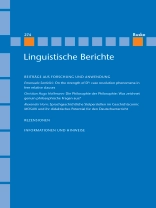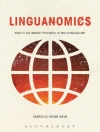Beiträge aus Forschung und Anwendung
– Emanuela Sanfelici: On the strength of D0: case resolution phenomena in free relative clauses
Abstract: This paper proposes a novel account of free relative clauses (RCs), which associates case resolution patterns to the typology of D0 heads à la Longobardi (1994), Guardiano & Longobardi (2005). Although free RCs generally obey matching requirements, certain languages tolerate configurations where the case assigned by the matrix clause to the nominal phrase containing the free RC conflicts with that assigned within the RC. Languages vary as to whether they allow for case conflicting configurations and apply case resolution, and, if they do, as to whether the case conflict is resolved in compliance with that assigned from the matrix or the RC probe. By adopting a cartographic approach to free RCs, I account for the linguistic variation by means of two ingredients: (a) the property of the D0 head in a given language, strong vs. weak D0, and, in turn, of the feature-sharing mechanisms between D0 and the lower heads; (b) the operation of chain reduction phrased in terms of a subset relation.
– Christian Hugo Hoffmann: Die Philosophie der Philosophie: Was zeichnet genuin philosophische Fragen aus?
Abstract: Philosophy cannot be studied without becoming engaged in philosophy itself. Taking Timothy Williamson’s seminal work ‘The Philosophy of Philosophy’ as a point of departure for this analysis at hand, and a specific question therein, in his book, presented by him as genuinely philosophical, we discuss in this paper what characterizes distinguished philosophical questions and what does not. While Williamson responds critically to the so-called linguistic and conceptual turn considered central to (analytic) philosophy by con-tending that his chosen question, representative of many more, is philosophical but not even implicitly meta-linguistic or meta-conceptual, our contribution is different and three-fold: first, in homage to Williamson, we show that he might not achieve his argumentative goal. Going beyond the limited framework set by his monograph, we further argue, second and more generally, that the predicate ‘being a philosophical question’ (such as his model question) suffers from vagueness. Finally, third, we derive implications from our investigation for the meta-philosophical answers of the Linguistic and Conceptual Turns.
– Alexander Horn: Sprachgeschichtliche Stolperstellen im Geschichtscomic MOSAIK und ihr didaktisches Potential für den Deutschunterricht.
Abstract: Up to now, comics have mainly been used for teaching literature. In this article, approaches of language teaching methodology for the use of comics in German classes are presented. Using the example of the history comic Mosaik, the article discusses different variants of language-historical staging. The didactic potential subsequently shown illustrates how comics can be used in language teaching to promote both vocabulary acquisition and the development of language criticism competence and thus the formation of language awareness among students.
Rezensionen
– Anja Müller: Fuchs, Julia (2020): Erwerb von Informationsstrukturellen Fähigkeiten – Produktion und Rezeption von (in)definiten Artikeln bei deutschsprachigen Kindern.
– Niklas Reinken: Andreas, Renate & Michael Andreas (2020): Praxis-Fachbuch für den kompetenten Rechtschreibunterricht. Neue Erkenntnisse – Neue Wege
Informationen und Hinweise
von Klaus Müllner und den Herausgeber*innen
Yazar hakkında
Nina-Kristin Meister (geborene Pendzich) hat an der Georg-August-Universität Göttingen Deutsche Philologie und Geschichte studiert und in Germanistischer Linguistik zum Thema »Lexikalische nichtmanuelle Markierungen in der Deutschen Gebärdensprache (DGS)« promoviert. Seit 2017 ist sie Leiterin des Experimentellen Gebärdensprachlabors am Seminar für Deutsche Philologie der Georg-August-Universität Göttingen und unterrichtet Germanistische Linguistik mit Schwerpunkt in der DGS. Ebenfalls seit 2017 ist sie in der Redaktion der Fachzeitschrift »Linguistische Berichte« tätig.












